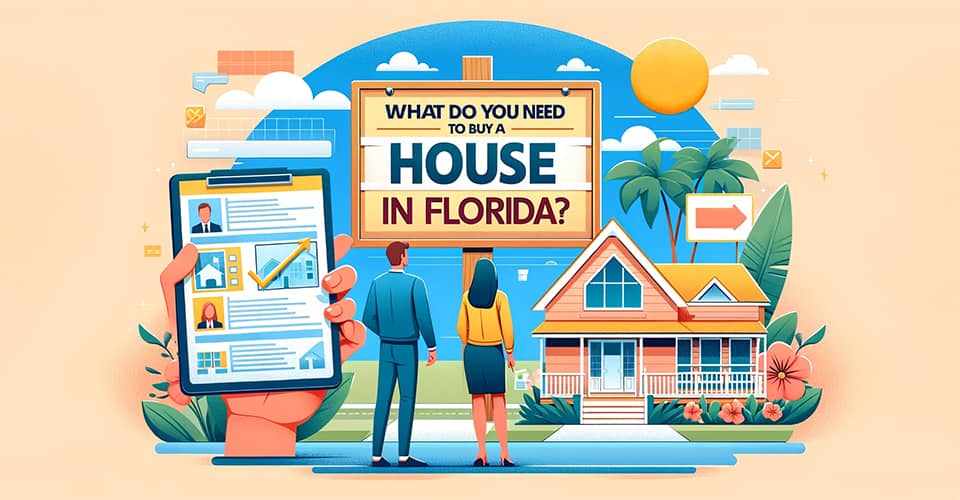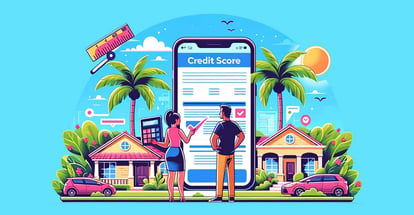What Do You Need To Buy a House in Florida? 7 Requirements for 2025
What does it take to buy a house in Florida? It's likely less complicated than you might expect. Just by taking a few straightforward steps, organizing your necessary documents, and securing a mortgage pre-approval, you can make the whole home-buying process smooth and manageable.
Say goodbye to renting and start building your own wealth through homeownership. Here's what you need to know to buy a house in Florida.
Key Points: The 7 Requirements to Buy a House in Florida
This guide goes into every one of these requirements in detail, but here's the key points you need to know:
Credit Eligibility
-
Minimum Credit Score: Qualify with a score as low as 580.
-
National Average FICO: 710; some programs have no score requirement.
-
Annual Credit Report: Free from AnnualCreditReport.com.
- Pre-Approval: Essential for understanding mortgage options.
Verification of Financial Status
-
Income Requirements: None specific, but proof of income and employment is needed.
-
Documentation: Pay stubs, W-2, tax returns, business evidence, job offer proof.
-
Debt-to-Income Ratio (DTI): Recommended under 43%, but can be higher.
- Factors: Timely bill payments, employment history, IRS-reported income.
Funds Required for Home Closing
-
Down Payment Programs: USDA, VA loans, and DPA for minimal or no down payment.
-
Closing Costs: Typically 1-2% of the home's purchase price.
- Examples: Buy a $350,000 home with as little as $15,750 or $0 with down payment assistance.
Setting Your Budget
-
Monthly Mortgage Components: PITIA (Principal, Interest, Taxes, Insurance, Association Dues).
-
Budgeting: Account for down payment, closing costs, and monthly payments.
- Loan Approval: Only borrow within comfortable limits.
Home Financing
-
Mortgage Options: Conventional, FHA, USDA, VA mortgages.
-
Conventional Loans: Popular, require at least 3% down, 620+ credit score.
-
FHA Loans: Lower down payment and flexible credit requirements.
-
USDA Loans: No down payment for rural areas.
- VA Loans: No down payment or mortgage insurance for military personnel.
Pre-Approval
-
Process: Lenders assess income, assets, and credit.
-
Benefit: Determines borrowing capacity and aids in negotiations.
-
Validity: Typically 90 days.
- Importance: Preferable over pre-qualification.
Real Estate Agent
-
Cost: Paid by the seller.
-
Benefits: Expertise in the market, negotiation, and process guidance.
- Selection: Choose an experienced, local, and trustworthy agent.

Credit Eligibility
For first-time homebuyers in Florida, understanding credit eligibility is crucial. While a low credit score can be a concern, Florida offers flexibility, allowing you to qualify for a mortgage with a credit score as low as 580, depending on the loan type and lender.
Interestingly, the national average FICO score is around 710, but some mortgage programs in the state do not require a credit score, widening the possibility for various buyers.
If your credit score is below average, it's not an automatic barrier to getting a loan. You have options such as providing a higher down payment or adding a co-signer to your application, which can help offset the perceived risk to lenders. This approach can make a significant difference in your loan approval chances.
Accessing a free annual credit report via AnnualCreditReport.com or any other site of your choosing is essential for all Florida homebuyers. This helps you understand your current credit status and is the easiest way to move toward pre-approval for a mortgage loan. Knowing your credit standing and addressing issues early can streamline your path to securing a mortgage.
In conclusion, a low credit score should not be a roadblock in your journey to owning a home in Florida. With various programs and strategies available, you can navigate the mortgage process successfully and work towards achieving your dream of homeownership.
So, don't let a low credit score stop you from pursuing your dream of owning a home in Florida.
Verification of Financial Status
In Florida, buying a house doesn't hinge on fixed income requirements, and your monthly income isn't the sole factor in securing a mortgage loan.
Lenders require various documents to assess your eligibility, including proof of employment, detailed financial history, monthly income, and debts.
For salaried employees, the documentation process involves submitting recent pay stubs and the year-end W-2 statement. Self-employed individuals must present their tax returns and evidence supporting their business operations. Those with a new job offer yet to commence work must provide the signed job offer letter as proof.
Lenders pay particular attention to your financial history, focusing on consistency in timely bill payments. Demonstrating a regular pattern of on-time payments is crucial, as it reflects your financial responsibility and bolsters your mortgage loan approval prospects.
A key aspect of the evaluation process is determining your debt-to-income ratio (DTI). This ratio compares your earnings against your expenditures, including housing payments and credit-related debts.
For instance, if you're spending $30 out of every $100 earned on such expenses, your DTI would stand at 30 percent. While the Consumer Financial Protection Bureau suggests maintaining a DTI ratio below 43 percent, certain lenders in Florida may consider applicants with a DTI ratio as high as 50 percent or more, especially if there are compensating factors like substantial savings, the inclusion of a co-signer, or a higher down payment.
Even if you have a modest income or are managing student loan debt, these conditions don't automatically disqualify you from obtaining a mortgage in Florida. Key to your application is a proven track record of timely bill payments and the ability to provide verifiable, IRS-reported income.
Meeting these criteria enhances your likelihood of mortgage approval, paving the way toward homeownership in Florida.
Funds Required for Home Closing
As a Florida homebuyer, you may wonder how much money you need to buy a home. The good news is that programs can help you buy a home with as little as 3 percent or even no down payment.
For example, USDA and VA loans have no down payment minimums, and low- and no-down payment mortgages are available to homeowners with all credit scores. These loans are particularly useful for home buyers with a reliable income but not much money saved.
In addition, down payment assistance (DPA) programs are also available to help you cover closing costs. Most first-time home buyers in Florida spend around 1-2 percent of the home's purchase price in closing costs.
For example, assuming a home sale price of $350,000 with a down payment of 3 percent and closing costs of 1.5 percent, you could purchase your first home with as little as $15,750. However, if you utilize a down payment assistance program, you could buy this home with $0 out of pocket.
Overall, these programs can help make homeownership in Florida more accessible and affordable, so be sure to explore all your options as you begin the home-buying process.
Setting Your Budget
In Florida's competitive housing market, being well-prepared is essential, especially when bidding on homes. Knowing how much you can comfortably spend on a house each month is important. Having a clear budget helps you stay ahead in your search for the perfect home.
When you're setting up your budget, make sure to include all the expenses that come with buying a house. This includes your down payment, any closing costs you might have to pay, and what you expect your monthly mortgage payments to be.
Typically, your monthly mortgage payment comprises several parts: PITIA, which stands for Principal, Interest, Taxes, Insurance, and, if you have them, Association Dues. These are all important to consider when you're figuring out your budget.
Also, remember that just because a bank might approve you for a big loan doesn't mean you have to borrow that much. It's really important to borrow only what you can afford and stick to a budget that makes sense. This way, you can enjoy your new home without worrying about costs.
Home Financing
When it comes to purchasing a home, most buyers use a mortgage. As a Florida home buyer, it's crucial to understand the different mortgage options available to you.
There are four primary mortgage loan types, each with its own set of rules:
Conventional mortgages
Conventional mortgages are one of the most popular types of mortgage loans available. Private lenders, such as banks, credit unions, or mortgage companies, offer them and are not backed by the government.
These loans require a down payment of at least 3% of the home's purchase price. If you buy a $300,000 home, you must put down at least $9,000 as a down payment.
To qualify for a conventional mortgage, you typically need to have a credit score of 620 or higher. Lenders will also look at your debt-to-income ratio, the amount of debt you have compared to your income. Generally, a debt-to-income ratio of 43% or lower is required to qualify for a conventional mortgage.
Conventional mortgages are a good option for those with a steady income, some money saved up, and good credit. They also have some advantages over other types of loans.
For example, if you can make a down payment of 20% or more, you can avoid paying private mortgage insurance (PMI). PMI is an additional cost added to your monthly mortgage payment to protect the lender if you default on the loan.
FHA mortgages
FHA mortgages are government-backed loans insured by the Federal Housing Administration (FHA). These loans are designed to help lower-income borrowers and those with lower credit scores to become homeowners.
The minimum down payment for an FHA loan is 3.5 percent of the home's purchase price, which is lower than the 20 percent typically required for a conventional loan.
In addition to a lower down payment requirement, FHA loans also have more flexible credit requirements than conventional loans.
Borrowers with credit scores as low as 500 may qualify for an FHA loan, although a higher score will likely result in better terms and a lower interest rate. However, borrowers with credit scores below 580 must make a down payment of at least 10 percent.
It's important to note that FHA loans come with an additional cost in mortgage insurance. Borrowers must pay an upfront mortgage insurance premium (MIP) at closing and an annual MIP that is added to their monthly mortgage payment. This insurance protects the lender in case the borrower defaults on the loan.
USDA mortgages
USDA mortgages are a type of government-backed home loan designed to promote homeownership in rural areas. The United States Department of Agriculture (USDA) guarantees these loans, meaning lenders can offer them to borrowers with more favorable terms than they might otherwise qualify for.
USDA mortgages typically require no down payment, making them an attractive option for first-time homebuyers or those with limited funds for a down payment.
To qualify for a USDA mortgage, the purchased home must be located in an eligible rural area, and the borrower's income must fall within certain limits.
VA mortgages
VA mortgages, also known as VA home loans, are available exclusively to current and past members of the U.S. military, including National Guard members and reservists who meet certain qualifications. These loans offer numerous benefits, including purchasing a home with no down payment required.
VA loans also don't require mortgage insurance, which can significantly reduce monthly mortgage payments. Additionally, VA loans have more lenient credit requirements and allow for higher debt-to-income ratios compared to conventional loans.
It's important to note that a VA funding fee is a one-time payment paid at closing and can vary depending on the borrower's military status and down payment amount.
Conventional loans are the most popular mortgage option for first-time home buyers in Florida, with 82 percent of them choosing this type of loan.
Pre-Approval
Before starting your house hunt, obtaining a pre-approval from a mortgage lender is crucial. This process helps you determine how much you can afford to spend on a home and provides a clear itemized estimate of all the costs involved in the transaction.
During pre-approval, lenders analyze your income, assets, and credit report to determine how much you can borrow and at what interest rate. It also helps you make a serious offer on a home and puts you in a better negotiating position with sellers.
Additionally, pre-approval can reveal potential improvements in your application to help you obtain a better mortgage rate and more favorable terms. This can include changing your financial situation, such as reducing debt or increasing your income.
It's essential to note that pre-approvals are typically valid for 90 days because your financial situation may change within that time frame. If you're still searching for a home after the 90-day mark, contact your lender to have it refreshed.
It's worth noting that pre-qualification is different from pre-approval. Pre-qualification provides an estimate of the amount you may be able to borrow based on your financial information but does not involve verification of your financial documentation.
Therefore, it's recommended that you get pre-approved instead of pre-qualified before house shopping.
Real Estate Agent
If you're buying a house in Florida, you usually don't have to pay for a real estate agent's services. The seller typically covers the agent fees for both their agent and the buyer's agent, meaning you can get an agent to help you without any cost. But remember, the way agents are paid can change based on where you are and the agreement between the seller and their agent.
Working with a real estate agent who knows what they're doing and who you trust can help make buying a home easier and less stressful. They can guide you to find houses that fit your budget and preferences, help you through the complicated buying process, negotiate on your behalf, and handle the paperwork for making an offer.
When looking for an agent, it's a good idea to talk to a few different ones to find the right fit. You'll want someone who understands the local housing market, has a good history of helping people buy homes, and is easy to talk to. It's important that you feel comfortable with your agent and that you can trust them to look out for your best interests.
Also, it's usually better to have your own agent instead of using the same agent as the seller. This setup, known as dual agency, can sometimes happen, but it might not be the best for you because it could create a conflict of interest. Having your agent means they're focused only on helping you make the best decisions as you buy your home.
Last Word
You're now ready to embark on your house-hunting adventure. Remember that buying a house differs from shopping for a car; you can't tailor every feature to your preference.
It's crucial to clearly understand what you need in a home, what you'd like to have, and what you can't tolerate. This clarity will guide you in deciding which properties to consider seriously and which ones to pass on.
While exploring potential homes, remember that the location is a significant factor. Keep getting to know the neighborhoods and communities you're interested in to ensure your chosen home aligns with your lifestyle and needs.
Dispelling a common misconception, you don't need a 20% down payment or a credit score in the high 700s to be a successful homebuyer.
Being pre-approved for a mortgage, steering clear of dual agency situations, and sticking to your budget can make you a strong contender in the housing market.
When you're touring open houses, it's beneficial to bring a notepad and a camera to jot down impressions and capture photos of the features that stand out, both positively and negatively.
Don't hesitate to ask your agent important questions about the property, like the roof or HVAC system age, any issues or repairs needed, and the reasons behind the sale.
Most importantly, don't feel pressured to make a swift offer on the first house you visit. Take your time to explore different options. This decision is a major investment, so finding a home that fulfills your criteria and feels right is vital. Your goal should be choosing a house you'll be happy to call home for many years.
With over 50 years of mortgage industry experience, we are here to help you achieve the American dream of owning a home. We strive to provide the best education before, during, and after you buy a home. Our advice is based on experience with Phil Ganz and Team closing over One billion dollars and helping countless families.

About Author - Phil Ganz
Phil Ganz has over 20+ years of experience in the residential financing space. With over a billion dollars of funded loans, Phil helps homebuyers configure the perfect mortgage plan. Whether it's your first home, a complex multiple-property purchase, or anything in between, Phil has the experience to help you achieve your goals.


 By
By  Edited by
Edited by 






